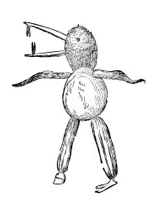Your poems seem to celebrate names and naming. Could you talk about where that celebratory impulse comes from?
I always want to discover a name to put in a poem such as Chidiock Tichborne, an almost impossible poet-name to say. I love naming and renaming, finding odd or strange or interesting names or ways of looking at things. I also love being surprised. I have a fear of writing the same poem over and over again, so I keep looking for more details that I haven't put in poems already. I don't want to get stuck. Don't poets feel that way? That they don't want to repeat themselves?
Where do you get such names?
First of all, I'm 62, so I've lived and have written poetry for a long time. My mother said I wrote my first poem when I was three, and maybe I did. My parents read to me a lot. My great aunt was Fanny Borden, Librarian of Vassar College, and she gave me many anthologies when I was little. I read the Rime of the Ancient Mariner early. I was lucky to grow up that way. But I think I do what most poets do: collect fragments of things like names or, if I hear something fascinating, write it down. I'm a fragment saver, as most poets must be. There's nothing special about it. It's just a good habit—you're never not writing. Wallace Stevens called it the freight-yard method: he had a drawer at work in which he put pieces of poems. I try to do that. But there's a danger in this method, because there can be too much junk in a poem sometimes, making the poem too damned cute, or show-offy. I guess I'm more interested in style than in content, because if you're really living your life you've already got content.
Are there particular styles that you find really compelling or interesting in contemporary American poetry?
Certainly the l=a=n=g=u=a=g=e school, although I don't want to read just their poetry—I'm scared of starting to write like them and getting in a rut. But it's very exciting, and I admire it tremendously. I love to read Jorie Graham's poetry as well. Even though I don't understand the philosophy part of it, I can scoot along on the style of it and get a lot. It's so exciting to find the dashes and switches in her poems. But experimentation in poetry has always been wonderful, back past Williams to Stein.
How did you start writing prose pieces? Specifically, how did the longer, more hybrid poems like "To Newfoundland" and "Hu-Kwa" come about?
It goes back to school. I got a Ph.D. in English in Creative Writing from the University of Wisconsin-Milwaukee in 1981, and one of my best teachers was Jim Hazard. He made us read prose often in the poetry writing courses. We had to read works by Isidor Lautréamont and Zbigniew Herbert and Julio Cortázar, lots and lots of them. So I didn't have any choice—I had to do the work. It was great fun, but really hard—Is this a prose poem? What is a prose poem? Can we agree exactly? Is it a story? Is it half a story? In the poem about Hu-Kwa the Chinese merchant, I was interested in the topic of the China trade. I looked at Chinese things in museums, I read Carl Crossman's book on the decorative arts of China and Jason Goodwin's book on the history of tea. A delicious tea is named after Hu-Kwa—it tastes like tarred line. Hu-Kwa was an admirable person, just as interesting and tough as any of the sea captains from the West, and he stood up to them. For the poem, I also liked the idea of people sitting on a ship at anchor talking about what they see. Nothing has to happen—they just yak. A Newfoundland dog is the speaker of "To Newfoundland." It's a poem about coming to America. But the discovery certainly didn't happen the way the poem promises it happened. We know the heroic and Perry-Miller versions of the discovery; a new version of the same old myth has to be entirely different—mock-heroic and casual, perhaps. Who would trust a dog speaker?
To read the rest of this interview, please click here to purchase JUBILAT 3



